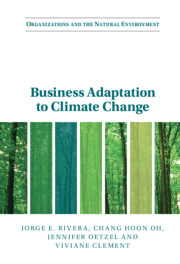4 results
4 - Can You Learn from the Second Kick of a Mule?
- from Part II - Conceptual Framework
-
- Book:
- Business Adaptation to Climate Change
- Published online:
- 28 April 2022
- Print publication:
- 12 May 2022, pp 62-78
-
- Chapter
- Export citation
8 - MNC Disaster Experience and Foreign Subsidiary Investment
- from Part III - Empirical Studies of Business Adaptation to Nature Adversity
-
- Book:
- Business Adaptation to Climate Change
- Published online:
- 28 April 2022
- Print publication:
- 12 May 2022, pp 171-222
-
- Chapter
- Export citation
7 - MNC Disregard of Natural Disasters and the Role of Host Country Context
- from Part III - Empirical Studies of Business Adaptation to Nature Adversity
-
- Book:
- Business Adaptation to Climate Change
- Published online:
- 28 April 2022
- Print publication:
- 12 May 2022, pp 133-170
-
- Chapter
- Export citation

Business Adaptation to Climate Change
-
- Published online:
- 28 April 2022
- Print publication:
- 12 May 2022

